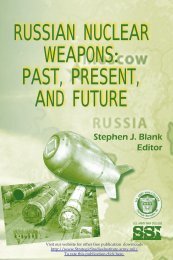The United States and China in Power Transition - Strategic Studies ...
The United States and China in Power Transition - Strategic Studies ...
The United States and China in Power Transition - Strategic Studies ...
You also want an ePaper? Increase the reach of your titles
YUMPU automatically turns print PDFs into web optimized ePapers that Google loves.
motivation beh<strong>in</strong>d this U.S. engagement policy was<br />
manifold. One, as President Nixon put it, was to “stop<br />
the 700 million Ch<strong>in</strong>ese from nurtur<strong>in</strong>g their hatred<br />
aga<strong>in</strong>st the Americans.” (<strong>The</strong> <strong>United</strong> <strong>States</strong> <strong>and</strong> <strong>Ch<strong>in</strong>a</strong><br />
were bitter enemies back then, <strong>and</strong> the <strong>United</strong> <strong>States</strong><br />
did not recognize the regime <strong>in</strong> Beij<strong>in</strong>g as a legitimate<br />
government for 30 years prior to the reconciliation <strong>in</strong><br />
1979.) 33 <strong>The</strong> other was to use <strong>Ch<strong>in</strong>a</strong> as a counterbalance<br />
aga<strong>in</strong>st the Soviet Union. <strong>The</strong> third, <strong>and</strong> a longterm<br />
goal, was that over time, economic development<br />
<strong>in</strong> <strong>Ch<strong>in</strong>a</strong> would br<strong>in</strong>g about political changes <strong>and</strong><br />
eventually turn <strong>Ch<strong>in</strong>a</strong> <strong>in</strong>to a democratic state. By virtue<br />
of be<strong>in</strong>g a democracy, <strong>Ch<strong>in</strong>a</strong> would have shared<br />
fundamental values with the <strong>United</strong> <strong>States</strong> <strong>and</strong> a prosperous<br />
<strong>Ch<strong>in</strong>a</strong> would be a U.S. friend rather than an<br />
enemy.<br />
This engagement policy served U.S. <strong>in</strong>terests<br />
well until the turn of the 1990s when the Cold War<br />
ended. As the <strong>United</strong> <strong>States</strong> led many <strong>in</strong> the world to<br />
celebrate the fall of Communism <strong>and</strong> the advance of<br />
democracy, Ch<strong>in</strong>ese leaders survived the shock <strong>and</strong><br />
reemerged from <strong>Ch<strong>in</strong>a</strong>’s <strong>in</strong>ternal political turmoil, the<br />
Tiananmen Square student movement, to defiantly<br />
reaffirm their determ<strong>in</strong>ation to cont<strong>in</strong>ue communist<br />
rule <strong>in</strong> <strong>Ch<strong>in</strong>a</strong> <strong>and</strong> resist U.S. heavy pressure for political<br />
change. This defiant act effectively recast <strong>Ch<strong>in</strong>a</strong>’s<br />
relationship with the <strong>United</strong> <strong>States</strong> as an unf<strong>in</strong>ished<br />
bus<strong>in</strong>ess of the Cold War. It also restored the ideological<br />
divide between the two nations that had been set<br />
aside <strong>in</strong> the previous decade for the strategic reasons<br />
mentioned above.<br />
This change was significant. It cast a dark shadow<br />
over <strong>Ch<strong>in</strong>a</strong>’s subsequent rise. Complicat<strong>in</strong>g this<br />
change of perception, <strong>Ch<strong>in</strong>a</strong> <strong>and</strong> the <strong>United</strong> <strong>States</strong> <strong>in</strong>advertently<br />
found themselves <strong>in</strong> a show of force over<br />
the Taiwan Strait crisis of 1995-96.<br />
51

















